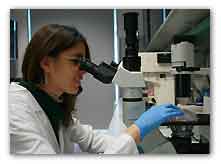News and Insights for
your best life. Online since 1998
- Home Health
- Breaking news
- In caso di...
- Per saperne di
più... - Medicina occidentale
- Medicine complementari
- Medicina cinese
e agopuntura - Omeopatia
- Fitoterapia

The adult brain, once considered immunologically privileged, is subject to considerable immune surveillance. The dynamic interaction between resident and recruited immune/inflammatory cell populations and the injured tissue enables the brain to respond to transplanted stem cells. As a consequence, the majority of cell types transplanted to the injured brain suffer poor survival.

In the experimental setting, high doses of immunosuppressant are needed, to improve efficacy and graft survival after allogenic- or xenotransplantation. Immunosuppression has potential toxic side effects for the acute brain injured patient. Therefore, a primary goal for translational research would be to assess the patient’s need for immunosuppression.
The need for immunosuppression after allo/xenogenic mesenchymal stromal cell (MSC) transplantation is debated. This study compared the long-term effects of human (h) bone marrow MSC transplant in immunocompetent or immunosuppressed traumatic brain injured (TBI) mice. C57Bl/6 male mice were subjected to TBI or sham surgery followed 24 h later by an intracerebroventricular infusion of phosphate buffer saline (PBS, control) or hMSC (150,000/5ml). Immunocompetent and cyclosporin A immunosuppressed (CsA) mice were analyzed for gene expression at 72 h, functional deficits and histological analysis atfive weeks. Gene expression analysis showed the effectiveness of immunosuppression (INFgreduction in CsA treated groups), with no evidence of early rejection (no changes of MHCII and CD86 in all TBI groups) and selective induction of T-reg (increase of Foxp3) only in the TBI hMSC group.
Five weeks after TBI, hMSC had comparable efficacy, with functional recovery (on both sensorimotor and cognitive deficits) and structural protection (contusion volume, vessel rescue effect, gliotic scar reduction, induction of neurogenesis) in immunosuppressed and immunocompetent mice.
Therefore, long-term hMSC efficacy in TBI is not dependent on immunosuppressive treatment.
These results provide urgently needed experimental evidence that the long-term presence and efficacy of hMSC in the injured brain is not impaired in the absence of immunosuppressive treatment. Thus hMSC isolated and expanded from donors, tested for their functional capabilities and stored as an “off the shelf” cell medicinal product could be made immediately available for a TBI patient, with no delay to therapy.
These findings could have important clinical implication since immunosuppression in acute TBI patients may increase their risk of infection and not be tolerated.
For more information
Immunosuppression does not affect human bone marrow mesenchymal stromal cell efficacy after transplantation in traumatized mice brain
Francesca Pischiutta, Giovanna D’Amico, Erica Dander, Andrea Biondi, Ettore Biagi, Giuseppe Citerio, Maria Grazia De Simoni, Elisa R. Zanier
MDN
del Dott. Turetta
Quali sono i problemi o le disfunzioni che possono giovarsi di un intervento omeopatico d'urgenza e, di conseguenza, come dovrebbe essere un ideale armadietto medicinale omeopatico casalingo.- Home -
- Health -
- Depressione -
- Sexuality
- Environment -
- Food -
- Musica -
- Capirsi -
- Grafologia -
- Ridere
Copyright © 1998/2018 www.mybestlife.com tutti i diritti sono riservati eccetto quelli già di altri proprietari.
.In caso di
Pubblicità
Per saperne di più su
Pubblicità
Pubblicità
Pubblicità
Pubblicità


